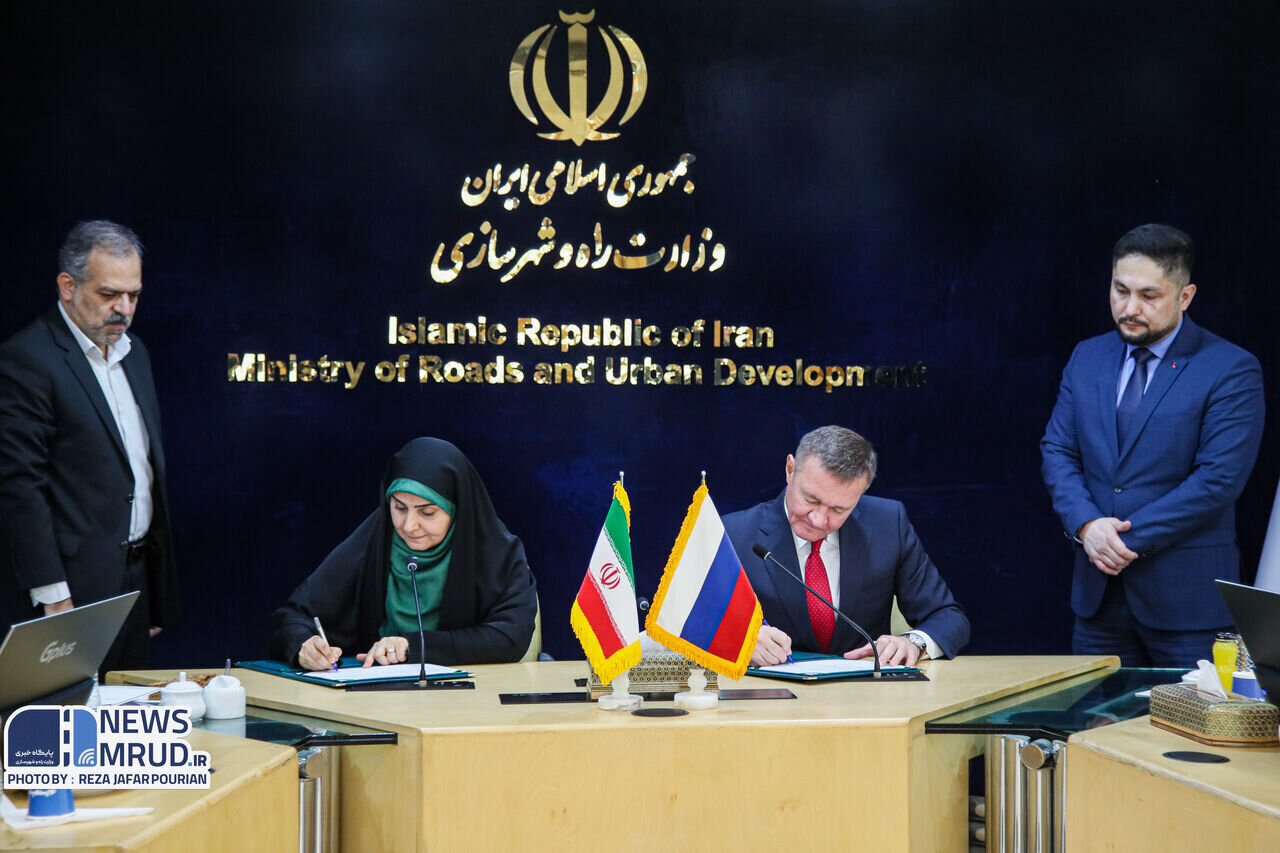Iran, Russia sign 2025 transport, transit cooperation roadmap

TEHRAN – Iran and Russia signed the 2025 transport and transit cooperation roadmap, along with an addendum for engineering studies on the Rasht-Astara railway project. The agreement was signed by Iran’s Minister of Transport and Urban Development Farzaneh Sadegh and Russia’s Minister of Transport Roman Vladimirovich Starovoyt.
According to Iran’s Transport and Urban Development Ministry, the bilateral meeting took place on Tuesday at the ministry’s headquarters in Tehran. The meeting was attended by senior Iranian transport officials, including Saeed Rasouli, Deputy Minister of Transport and Acting Head of the Ports and Maritime Organization; Jabarali Zakeri, the head of Iran’s Railway Company; Houshang Bazvand, head of the Transport Infrastructure Development Company; and Amin Tarafo’, head of the International Affairs Center at the ministry.
Minister Sadegh welcomed the Russian delegation, emphasizing the importance of regular meetings to enhance bilateral cooperation. She highlighted that continued discussions would help both countries achieve their objectives in completing the International North-South Transport Corridor (INSTC).
Sadegh also pointed to the ongoing third Caspian Economic Forum, hosted by Iran with Russia’s participation, describing it as a pivotal event for strengthening economic, trade, and transport ties between the two nations and other Caspian region countries.
The Iranian minister expressed hope that the final contract for the Rasht-Astara railway project would be signed by the end of the current Iranian year (late March), following the finalization of project volumes and costs. She noted that land acquisition for the railway was progressing rapidly and would be completed within a year.
Sadegh welcomed Russian President Vladimir Putin’s approval of engineering studies for the Rasht-Astara railway before the finalization of the land acquisition schedule, calling it a positive step toward accelerating the project.
She also highlighted the upcoming trilateral meeting between Iran, Russia, and Azerbaijan, where the three countries would define cooperation levels for the western branch of the INSTC in the Caspian Sea’s western region. Additionally, she stressed the importance of focusing on the corridor’s eastern branch, identifying transit costs for both routes, and addressing bottlenecks.
Sadegh emphasized the potential for Russian cargo to reach Pakistan via Iran, reaffirming Tehran’s commitment to maximizing its transit capabilities. She also called for simplifying visa procedures for truck drivers, increasing the use of the Caspian Sea for freight and passenger transport, and expanding air transport cooperation, including flight frequency increases, airline partnerships, new routes, airport collaboration, and aircraft maintenance experience exchanges.
Russia proposes Caspian consortium
In response, Russian Transport Minister Starovoyt supported Iran’s proposals and suggested establishing a Caspian transport consortium. Minister Sadegh welcomed the idea, stating that Iran and Russia should take the lead in implementing the initiative.
She concluded that close Iran-Russia cooperation had been consistently encouraged by both countries’ leaders and would benefit their respective populations.
Iran, Russia plan comprehensive Caspian maritime roadmap
Also on the sidelines of the Caspian Economic Forum, Dmitry Azarov, Russia’s Deputy Minister of Transport, met with Saeed Rasouli, Iran’s Deputy Transport Minister and Acting Head of the Ports and Maritime Organization, to discuss expanding combined transit through the Caspian Sea and facilitating container shipping. Plans for launching a cruise route between Iran’s Anzali Port and Russia’s Astrakhan Port were also discussed.
Azarov stated that Moscow is ready to address logistical challenges in Caspian maritime transport, including streamlining vessel scheduling and expediting the handling of perishable and sensitive cargo. He noted that Russia is enhancing the infrastructure of Makhachkala Port to improve docking and cargo operations and expressed interest in reaching a comprehensive maritime and port cooperation agreement with Iran.
Tehran’s readiness for a maritime cooperation summit
Rasouli, for his part, said Iran seeks to enhance maritime and shipping cooperation with Russia through a joint action plan. He emphasized that Iran is pursuing simultaneous development in rail-port and road-port connectivity.
Highlighting the need for a comprehensive Caspian maritime roadmap, Rasouli called for harmonizing port tariffs, facilitating multimodal transit via the Caspian route, and improving container transit operations between Iranian and Russian ports. He announced Iran’s readiness to hold a maritime cooperation summit with Russia to finalize a joint maritime roadmap.
128% growth in Iran’s maritime transit
Jalil Eslami, Deputy Head of Iran’s Ports and Maritime Organization, revealed that maritime transit via Iranian ports had surged by 128 percent over the past year, with Kazakhstan and Turkmenistan accounting for most of the cargo.
However, Eslami noted ongoing issues with Iranian shipping in Russian ports, including scheduling inefficiencies, inadequate port services such as pilotage, and strict inspections. He called for improved conditions for handling hazardous and perishable goods.
Eslami also announced Iran’s readiness to launch cruise and passenger shipping services with Russian ports, urging Russia to allocate a suitable cruise vessel for the route.
Additionally, he highlighted the prolonged six-year delay in finalizing a maritime safety agreement for search-and-rescue operations and ship inspections between the two countries, calling for swift resolution.
EF/MA
Photo: Iran’s Transport Minister Farzaneh Sadegh (L) and Russia’s Minister of Transport Roman Vladimirovich Starovoyt sign transport roadmap documents in Tehran on Tuesday.
Leave a Comment